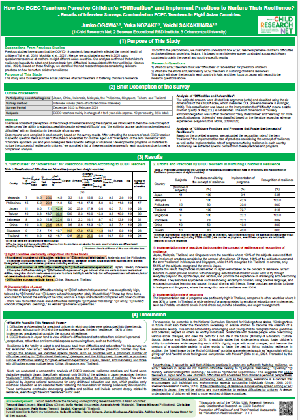 |
Rationales
Previous studies have shown that the COVID-19 pandemic has negatively affected the mental health of children (Tull et al., 2020; Mochida et al., 2021). Hence, we conducted a survey in 2021 using questionnaires aimed at mothers in eight different Asian countries. Our analysis confirmed that children's resilience (capacity to adapt and bounce back from difficulties) is associated with their well-being (Ogawa et al., 2024). Based on these findings, we identified the next research topic as considering childcare practices on how to nurture children's resilience.
Purposes and research question(s) of the study
This study aims to investigate the actual practices of ECEC teachers in fostering children's resilience. It is based on an interview survey conducted across eight Asian countries to obtain the overall and country-specific results. Additionally, we intend to understand how ECEC teachers perceive children's difficulties and adversities as underlying factors.
Methods used
Our survey was conducted through semi-structured online interviews between December 2023 and February 2024. Approximately ten ECEC teachers responsible for children aged 4-6 in eight Asian countries (approx. 80 in sum) were interviewed, using the same set of question items for all countries.
Case reports were compiled in each country based on the survey results. After extracting the answers of each ECEC teacher to specific question items such as "Difficulties or adversities for children aged 4-6" "Perception of the term 'resilience'" and "Childcare approach you and your colleagues take / specific settings or situations / developmental programs or materials to nurture the concept of resilience in children," we compiled a list of these extracted answers for each country and performed a comparison analysis.
Findings and implications
In this survey, we first examined how ECEC teachers perceive difficulties and adversities preschool children may face. Through this analysis, we identified specific trends, such as countries with a prominent number of difficulties relating to "Emotional Well-being" (Malaysia and the Philippines), those with a prominent number of difficulties relating to "Self-esteem/Independence" (Japan, Taiwan, and Indonesia), and those with difficulties across multiple items (China, Singapore, and Thailand).
Next, we conducted a comparative analysis of ECEC teachers' resilience practices. Japan, Malaysia, Thailand, and Singapore were the countries where 100% of the subjects answered that they implement practices considering the concept of resilience. Of these, 100% of the subjects recognized the term "resilience" in Malaysia and Singapore, while 81.8% recognized it in Thailand. In contrast, only 54.5% of the subjects recognized the term in Japan.
In sum, this study revealed common factors and country-specific differences in the way ECEC teachers perceive children's difficulties and adversities, as well as in their childcare practices to promote resilience - the ability to overcome such difficulties. In this article, we will discuss these common factors and differences, and then focus on Japan with regard to the above findings.
*This poster is a partially modified version of the poster presented at the PECERA Annual Conference 2024 Tokyo, held in Japan from August 2 to 4, 2024.



 Junko Ogawa
Junko Ogawa Yuka Nozaki
Yuka Nozaki










